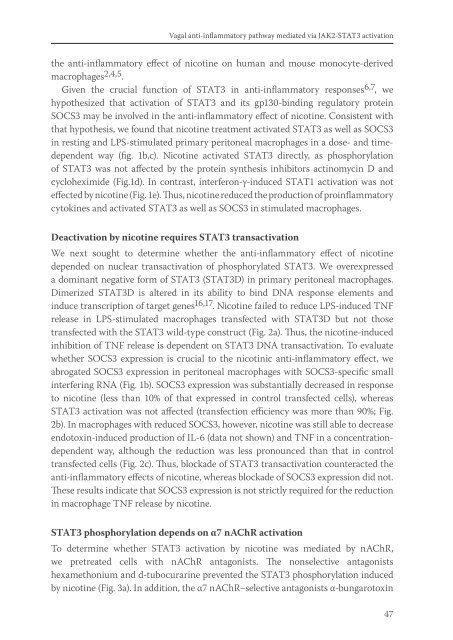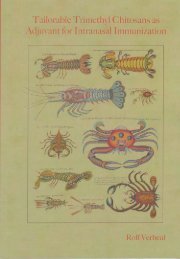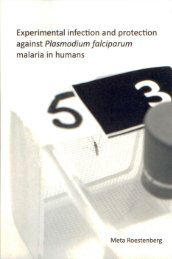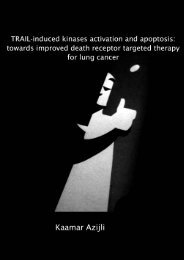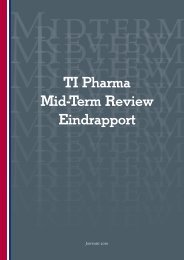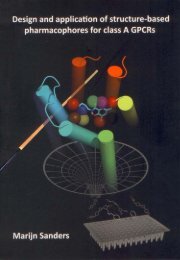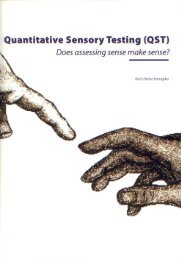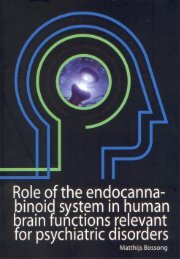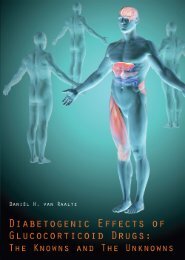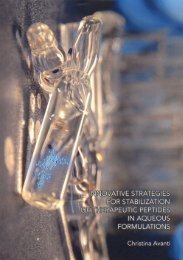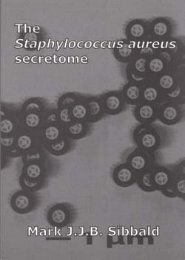The vagus nerve as a modulator of intestinal inflammation - TI Pharma
The vagus nerve as a modulator of intestinal inflammation - TI Pharma
The vagus nerve as a modulator of intestinal inflammation - TI Pharma
You also want an ePaper? Increase the reach of your titles
YUMPU automatically turns print PDFs into web optimized ePapers that Google loves.
Vagal anti-inflammatory pathway mediated via JAK2-STAT3 activation<br />
the anti-inflammatory effect <strong>of</strong> nicotine on human and mouse monocyte-derived<br />
macrophages 2,4,5 .<br />
Given the crucial function <strong>of</strong> STAT3 in anti-inflammatory responses 6,7 , we<br />
hypothesized that activation <strong>of</strong> STAT3 and its gp130-binding regulatory protein<br />
SOCS3 may be involved in the anti-inflammatory effect <strong>of</strong> nicotine. Consistent with<br />
that hypothesis, we found that nicotine treatment activated STAT3 <strong>as</strong> well <strong>as</strong> SOCS3<br />
in resting and LPS-stimulated primary peritoneal macrophages in a dose- and timedependent<br />
way (fig. 1b,c). Nicotine activated STAT3 directly, <strong>as</strong> phosphorylation<br />
<strong>of</strong> STAT3 w<strong>as</strong> not affected by the protein synthesis inhibitors actinomycin D and<br />
cycloheximide (Fig.1d). In contr<strong>as</strong>t, interferon-γ-induced STAT1 activation w<strong>as</strong> not<br />
effected by nicotine (Fig. 1e). Thus, nicotine reduced the production <strong>of</strong> proinflammatory<br />
cytokines and activated STAT3 <strong>as</strong> well <strong>as</strong> SOCS3 in stimulated macrophages.<br />
Deactivation by nicotine requires STAT3 transactivation<br />
We next sought to determine whether the anti-inflammatory effect <strong>of</strong> nicotine<br />
depended on nuclear transactivation <strong>of</strong> phosphorylated STAT3. We overexpressed<br />
a dominant negative form <strong>of</strong> STAT3 (STAT3D) in primary peritoneal macrophages.<br />
Dimerized STAT3D is altered in its ability to bind DNA response elements and<br />
induce transcription <strong>of</strong> target genes16,17 . Nicotine failed to reduce LPS-induced TNF<br />
rele<strong>as</strong>e in LPS-stimulated macrophages transfected with STAT3D but not those<br />
transfected with the STAT3 wild-type construct (Fig. 2a). Thus, the nicotine-induced<br />
inhibition <strong>of</strong> TNF rele<strong>as</strong>e is dependent on STAT3 DNA transactivation. To evaluate<br />
whether SOCS3 expression is crucial to the nicotinic anti-inflammatory effect, we<br />
abrogated SOCS3 expression in peritoneal macrophages with SOCS3-specific small<br />
interfering RNA (Fig. 1b). SOCS3 expression w<strong>as</strong> substantially decre<strong>as</strong>ed in response<br />
to nicotine (less than 10% <strong>of</strong> that expressed in control transfected cells), where<strong>as</strong><br />
STAT3 activation w<strong>as</strong> not affected (transfection efficiency w<strong>as</strong> more than 90%; Fig.<br />
2b). In macrophages with reduced SOCS3, however, nicotine w<strong>as</strong> still able to decre<strong>as</strong>e<br />
endotoxin-induced production <strong>of</strong> IL-6 (data not shown) and TNF in a concentrationdependent<br />
way, although the reduction w<strong>as</strong> less pronounced than that in control<br />
transfected cells (Fig. 2c). Thus, blockade <strong>of</strong> STAT3 transactivation counteracted the<br />
anti-inflammatory effects <strong>of</strong> nicotine, where<strong>as</strong> blockade <strong>of</strong> SOCS3 expression did not.<br />
<strong>The</strong>se results indicate that SOCS3 expression is not strictly required for the reduction<br />
in macrophage TNF rele<strong>as</strong>e by nicotine.<br />
STAT3 phosphorylation depends on α7 nAChR activation<br />
To determine whether STAT3 activation by nicotine w<strong>as</strong> mediated by nAChR,<br />
we pretreated cells with nAChR antagonists. <strong>The</strong> nonselective antagonists<br />
hexamethonium and d-tubocurarine prevented the STAT3 phosphorylation induced<br />
by nicotine (Fig. 3a). In addition, the α7 nAChR−selective antagonists α-bungarotoxin<br />
47


